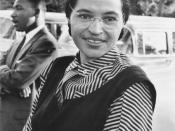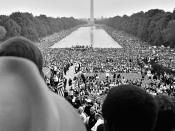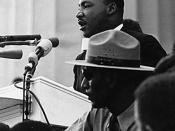Shannon Bushell
12Â3Â13
Period 6
Antony and Martin Luther King's Use of Rhetorical Devices
The use of various different rhetorical devices can make a speech so much more effective
and appealing towards the audience. In the story Julius Caesar by Shakespeare, Antony makes a
speech at the funeral of his 'friend' Julius Caesar and because of his strong use of rhetorical
devices, by the end of his speech, all of the plebeians were enraged over Caesar's death and
seeked revenge towards the killers of their loved one. In Martin Luther King's famous speech 'I
Have a Dream', which called out the large amount of racism and hate in America, he used many
different rhetorical devices to effectively rile up the people and make them want to change
America for the better. Perhaps the most effective rhetorical devices, ethos, pathos and logos,
are used in both Antony's speech and Martin Luther King's speech to strengthen them and
make them very powerful.
Antony and Martin Luther King both use ethos in their speeches. In Antony's speech, he
states, "The evil that men do lives after them; the good is oft interred with their bones,"
(Shakespeare 121, Line 84). This means that people are more quickly remembered for the
mistakes they made and the wrong they did, rather than for anything good they accomplished.
Antony makes an ethical connection to the plebeians by saying this and instantly gets them
thinking and realizing that maybe Caesar did do some good things for the city, but everyone was
distracted by his wrongdoings. In Martin Luther King's speech, he says, "One hundred years
later, the life of the Negro is still sadly crippled by the manacles of segregation and the chains of
discrimination," (1). He is saying that one hundred years after slavery ended, African Americans...


